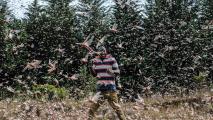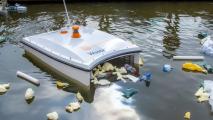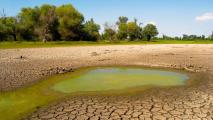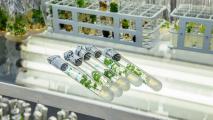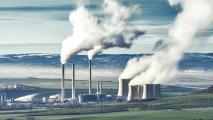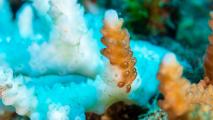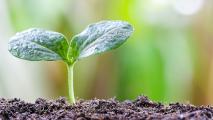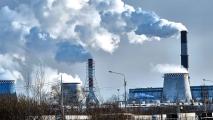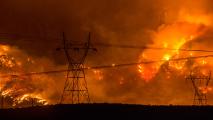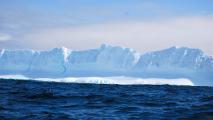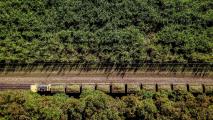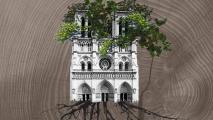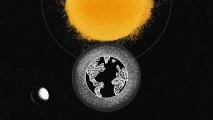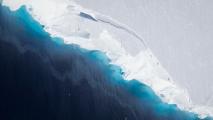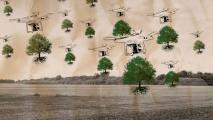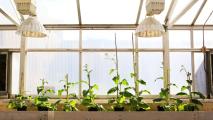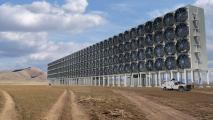Field: Climate Crisis
Can seaweed save the planet?
A Maine startup is growing vast quantities of seaweed and then burying them at the bottom of the ocean to sequester carbon for carbon offsets.
How tech helped beat back locust swarms in East Africa
Billions of locusts descended on East Africa in 2020, where new technology helped stop their spread.
Autonomous trash-eating boats clean up water pollution
New designs in autonomous boats, and a trash wheel that intercepts drifting trash, act as on-the-water trash-eating machines.
The world's whitest paint can cool your house — and the Earth
The whitest white paint reflects up to 98.1% of sunlight, which could make it useful for cooling homes in place of energy-hogging air conditioners.
Can weather modification save us from megadroughts?
Scientists predict that the western U.S. is entering the most severe "megadrought" on record. One weather modification solution is cloud seeding.
Should we genetically engineer carbon-hungry trees?
Genetically modified trees that are designed to grow faster and store more carbon could help reverse climate change.
Elon Musk offers $100 million for direct carbon capture tech
A new Xprize competition funded by Elon Musk offers $100 million in prizes for scalable direct carbon capture technology.
New findings could help wine survive climate change
Climate change is altering wine making as we know it. Researchers at UC Davis have identified what makes some grapes more resistant to water stress.
Making it rain with “cloud seeding”
China is using cloud seeding to create rain where and when it’s needed. Will it try to use geoengineering to combat climate change next?
CRISPR could help save coral reefs from bleaching
Using CRISPR, scientists have identified a gene that could determine whether coral reefs are highly susceptible to bleaching or not.
We can grow 60% more food by hacking photosynthesis
By improving photosynthesis, we can get more food from our farmland.
This Canadian startup wants to make our buildings out of CO2
Carbon capture technology is here, but how do we make it feasible?
“Digital Earth” can simulate climate change down to the kilometer
Europe’s ambitious Destination Earth project aims to simulate climate systems — and human impact — to the kilometer.
Predator drones are using AI to create faster fire maps
The National Guard has used drones to create forest fire maps since 2017. New AI upgrades could make the maps in minutes, not hours.
Can trillions of reflective glass beads save arctic sea ice?
Arctic sea ice is more than majestic; it also reflects the sun’s rays. But young, thin ice melts fast. Can silica powder reflect enough sun to help it survive?
Doctors fighting deadly climate change
In partnership with Skoll Foundation
These doctors are coming together to address their collective carbon footprint, explore new solutions, and improve sustainability in healthcare.
Cooling the planet with a giant solar umbrella
Solar geoengineering would cool global temperatures — is it worth it?
Could a Norwegian “hurricane net” stop storms by cooling the sea?
Norwegian company OceanTherm uses bubble nets to keep ice out of fjords. Could a hurricane net weaken the storms?
Raising Pacific islands to save them from high sea levels
The president of Kiribati announced a new plan to fight against sea level rise: raise the islands.
Fertilizer feeds half the world. Can we make it without fossil fuels?
Fertilizer is needed to feed the world, but its production comes with a carbon footprint. This solar-powered strategy may reduce that.
Sending heat to space to reverse global warming
This high-tech material could reverse global warming by using radiative cooling to lower the Earth’s rising temperature.
A new approach to green building could reverse climate change
The building sector is one of the biggest contributors of greenhouse gas emissions. But new research suggests that trend could stop, and even reverse because of a new type of green building.
The hidden history in the Notre Dame attic
Studying the scarce, centuries-old logs that remain from the Notre Dame attic will help scientists reconstruct medieval climate data to see if temperatures were ever this high.
Open-sourcing the blueprints for a nuclear power plant
The Energy Impact Center has open-sourced nuclear power plant blueprints in an attempt to encourage the adoption of eco-friendly nuclear energy.
Changing flight altitudes could help minimize contrails
A study found that flying a small percentage of planes at slightly different altitudes could significantly decrease contrails, a global warming contributor.
Series|
Guardians of the Apocalypse
Geoengineering: Our last defense against climate change
Reflecting the sun’s rays is a proposed last-ditch effort to mitigate the effects of global warming. This Harvard research team is trying to better understand the potential risks in order to save the planet.
Modifying poplar tree genes to fight pollution
The number of poplar trees around the world has doubled, but a chemical compound in their leaves means they might be doing more harm than good.
The robot racing to study Antarctica’s massive ice melt
Icefin, a semi-autonomous research vessel, is on a mission to search for clues about one of the continent’s fastest melting glaciers, the Thwaites Glacier.
Tree-planting drones restore charred forests
This Seattle startup is bringing new life to charred forests by releasing swarms of smart, tree-planting drones equipped with seeds, mini seedbeds, and cameras.
9 ways the 2010s decade changed the world
From Tinder to CRISPR, these are the top moments, movements, and ideas through which the 2010s decade shaped the world as we know it.
This big wave surfer is changing how we fight wildfires
Fire retardant spray contains toxins that are harmful to the environment and first responders, but Jeff Denholm is looking to change that.
Ship’s logbooks are the first records of climate change data
With the weather and ice data from old ship’s logs, Dr. Kevin Wood realized it was possible to reconstruct the history of sea ice in the Arctic to better understand climate change.
Sifting through sound: using soundscapes to understand ecosystem health
“Ecoacoustics” is an emerging field of research. Instead of chasing down isolated animal sounds, researchers are using all of the acoustic properties of a location to answer ecological questions.
Series|
Seachange
Carbon capture technology explained
Cutting-edge carbon capture technology is bringing the world’s top scientists and engineers one step closer to solving the climate change puzzle.
Series|
Seachange
The rural Mexican village planting 5 million trees
Reforestation projects could be just what we need to turn the tide of climate change, and this Mexican village is setting an example for all to follow.
Preparing for climate change
Climate change is increasingly reshaping our world, but communities across America aren’t losing hope — they’re taking action. Learn how 18 communities are using science to guide community-based decision-making.
Researchers found a species of stony coral ready to withstand climate change
At current trends, more than 90% of the world’s coral reefs will be massively degraded by 2050. Researchers have found a species of stoney coral that has sparked new efforts for coral reef restoration.
Series|
Seachange
How to save the coral reefs
Coral reefs are the foundation of ocean life, and yet 50% of them have been lost. Here’s why coral reefs are dying and what one group is doing to stop it.
A community at the frontlines of the war on wildfire
When facing literal hellfire, this community effort may be the only way to protect homes and lives from devastating wildfires.
Hacking surfboard fins to fight climate change
How can a surfboard modification help save the oceans?
Supercharging photosynthesis can grow 40% more food
We need a lot more calories to feed a growing world, and these scientists may have figured out how to get them.
The cost of sucking carbon out of the air just fell by 85%
It's not there yet, but carbon capture just got interesting.
Organic solar is (finally) efficient enough to compete
Reliable power straight from the sun looks more achievable than ever.

